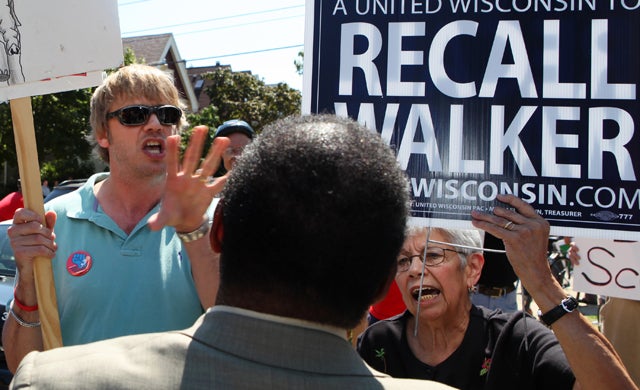The political battle over Wisconsin Governor Scott Walker’s (R) recall is heating up. Four Democrats have filed paperwork to appear on the ballot opposite Walker, and the President’s re-election team has joined the fray, attacking Walker by name. The conflict has even infected the supposedly independent state judiciary. Recent investigations have revealed no less than 29 Wisconsin state circuit court judges who signed recall petitions against the sitting governor, raising the specter of ethics violations and political bias by ostensibly nonpartisan judges.
Judges are expected, according to their code of ethics, “to avoid impropriety and the appearance of impropriety in all…activities”; they must “act at all times in a manner that promotes public confidence in the integrity and impartiality of the judiciary.” The 29 circuit court judges’ partisan acts do exactly the opposite: erode public confidence by showing their bias against specific political figures.
It is important to note that judges do not enjoy the same expectation of political freedom as private citizens. Wisconsin’s judicial code of ethics instructs them to “expect to be the subject of consistent public scrutiny.” Accordingly, “a judge must therefore accept restrictions on [his or her] conduct that might be viewed as burdensome by the ordinary citizen and should do so freely and willingly.”
Judges are also forbidden by their code of ethics from “publicly[ly] endors[ing] or speak[ing] on behalf of [a political party’s] candidates or platforms.” According to its own website, the Wisconsin Democratic Party is fully and officially committed to Walker’s recall. Furthermore, the fact that signing recall petitions is not specifically listed in the judicial ethics code should not lead judges to think they can participate in such political activity, since the list of prohibited acts “extend[s] to conduct by judges that is harmful although not specifically mentioned [in the code].”
Accordingly, Landmark Legal Foundation has requested an ethics investigation into the more than two dozen judges. In a letter to the Wisconsin Judicial Commission, Landmark Legal President Mark Levin asked for any of the 29 judges presiding over cases in which Governor Walker or his administration is a party to recuse themselves. Arguing that support for the removal of an official from office is equivalent to support for a candidate for office, Levin called for swift action against these “egregious ethical violations.”
Still, the Wisconsin judges claim they did nothing wrong. “I concluded that by signing a recall petition I wasn’t advocating for a particular party, I was advocating for the recall process, which I thought was completely separate and apart,” one judge told the Associated Press. Yet not one of the state’s 16 appeals court judges nor any of the state’s Supreme Court justices signed any such petition. According to the AP, former Wisconsin Supreme Court Justice Janine Geske admits that “[signing the petition] creates a problem with the appearance of impartiality if and when they may be called upon to decide any issues involving the governor or the Republican Party.”
An example of a judge who signed the petition whose impartiality has been called into question is Dane County Circuit Court Judge David Flanagan, who signed an anti-Walker petition shortly before issuing a sloppily written injunction against Wisconsin’s voter ID law (Flanagan’s injunction misquoted the Wisconsin state constitution and referred to a nonexistent Supreme Court Justice, “William Scalia”). Governor Walker’s support of voter ID, along with his position on public employee unions, is one of the main reasons he has earned the ire of Badger State Democrats and triggered the recall effort in the first place.
Flanagan’s public political support of the recall effort thus raises serious questions about his ability to act impartially on the voter ID case before him. With the gubernatorial recall election currently set for June 5, any legal actions potentially affecting the outcomes of elections—including, notably, the voter ID law—demand significant scrutiny. At the very least, Wisconsin voters deserve better than judges engaging in the partisan act of publicly supporting a recall where the campaign to unseat the governor is largely based upon opposition to the very laws that the judges have been asked to examine.
Travis LaCouter is currently a member of the Young Leaders Program at The Heritage Foundation. For more information on interning at Heritage, please visit: http://www.heritage.org/about/departments/ylp.cfm
